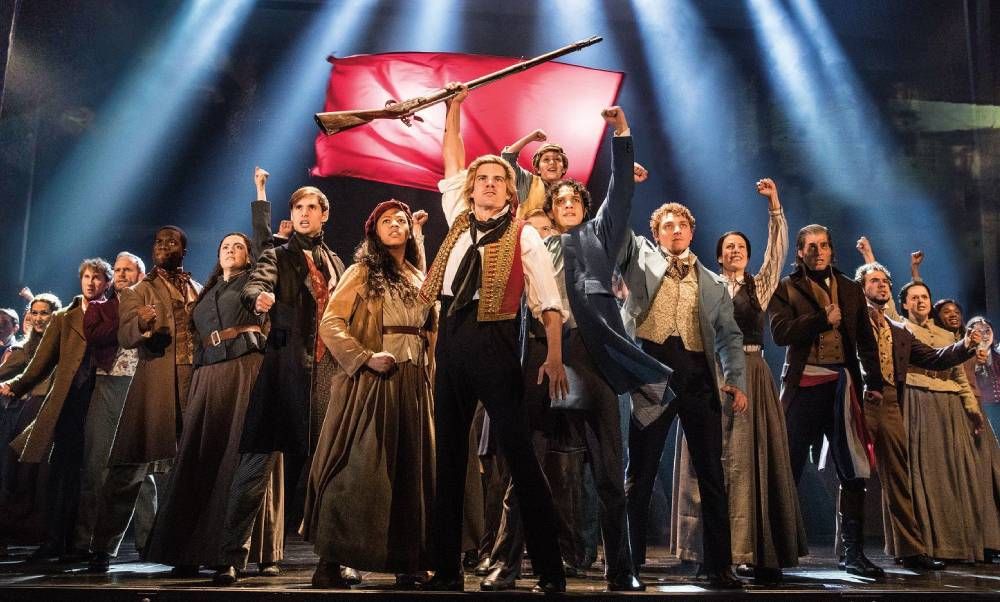The year is 2013. The air crackles with anticipation as the nominees for Best Picture are called out. “Argo,” “Beasts of the Southern Wild,” “Django Unchained,” and… “Les Misérables.” The room erupts, a wave of cheers and applause as the cameras capture the raw emotion on the faces of the cast and crew. This was no ordinary nomination. This was the culmination of a dream, a testament to the power of music, and a confirmation that the most enduring stories are those that capture the heart. “Les Misérables” had arrived, and it was going to change everything.

Image: www.filmedonstage.com
Music has the power to transcend language, culture, and even time itself. It can stir our emotions, evoke memories, and unite us in a shared experience. That’s the magic of “Les Misérables,” a musical that isn’t just about singing and dancing; it’s a testament to the human spirit’s resilience, its capacity for love, hope, and even forgiveness, set against the backdrop of a turbulent and brutal era. From the haunting melodies of “I Dreamed a Dream” to the rousing chorus of “One Day More,” the music pulls us into the lives of these characters, making us feel their pain, their dreams, their desperation, and ultimately, their triumph.
A Musical Revolution: How “Les Misérables” Redefined the Oscars
“Les Misérables” wasn’t just nominated for Best Picture; it was nominated for eight awards, including Best Actor for Hugh Jackman, Best Supporting Actor for Tom Hardy, and Best Supporting Actress for Anne Hathaway. The film, directed by Tom Hooper, was a gamble – a live-singing, live-orchestral experience, a direct adaptation of the stage production. It was a risk that paid off, a masterpiece born out of the courage to push boundaries and embrace a bold vision.
The film’s success was a testament to the enduring power of the original story, the brilliance of the adaptation, and the phenomenal performances of the cast. Hugh Jackman, as Jean Valjean, embodies the very essence of hope and redemption, his voice resonating with both vulnerability and strength. Anne Hathaway’s performance as Fantine, heartbreaking and raw, brought her an Oscar for Best Supporting Actress, solidifying her place as a Hollywood powerhouse. And Tom Hardy’s portrayal of the conflicted Javert, a man wrestling with his own morals, was a masterclass in intensity and restraint.
But “Les Misérables” wasn’t just about individual performances; it was about the ensemble, a chorus of voices united by a shared destiny. The opening number, “Look Down,” set the stage for the film’s themes of poverty, inequality, and the fight for justice. The iconic “One Day More,” a chorus of dreams and desires, captured the urgency of the moment, the desperation of the characters, and the hope that perhaps, just maybe, things could change.
The Music of Our Hearts: How “Les Misérables” Captured the World’s Imagination
The film’s soundtrack, a collection of timeless melodies and powerful lyrics, resonated with audiences around the globe. Even those who hadn’t seen the film found themselves humming “I Dreamed a Dream” or singing along to “Do You Hear the People Sing.” The music, a tapestry woven with pain and hope, love and loss, spoke to a universal human experience. It reminded us that we’re all connected, that we all share the same dreams, the same fears, the same aspirations.
“Les Misérables” wasn’t just a film or a musical; it was a phenomenon. It was a story that resonated with audiences of all ages, from every corner of the world. It was a reminder of the power of music, its ability to evoke powerful emotions, to tell stories without words, to ignite hope, and to unite us in a shared experience.
In a world often consumed by negativity, “Les Misérables” offered a glimmer of hope, a testament to the enduring human spirit. It showed us that even in the darkest of times, there is always room for love, forgiveness, and redemption. It reminded us that even in the face of adversity, we can find the strength to rise above and fight for a better future.
Beyond the Oscars: The Legacy of “Les Misérables”
The awards and recognition are important, but they pale in comparison to the impact “Les Misérables” has had on audiences worldwide. The film has reignited interest in the original novel, introduced the story to a whole new generation, and inspired countless productions across the globe. It has proven that great stories transcend time and touch hearts in ways that words alone never could.
“Les Misérables” was more than a film; it was a journey. A journey into the depths of the human soul, into the heart of a story that has touched millions of lives. And for those lucky enough to have experienced it, it’s a memory that will stay with them forever, a reminder that even in the face of adversity, even in the midst of darkness, there is always hope, always the possibility of a “One Day More.”
Image: www.dailymotion.com
One Day More Les Miserables Oscars
A Call to Action: Unleash Your Inner Revolution
“Les Misérables” is a testament to the power of music, the resilience of the human spirit, and the enduring nature of great stories. Its legacy lives on, inspiring new generations to embrace the power of their own voices and fight for a better future. This is your call to action: let the music move you, let the story inspire you, and let “Les Misérables” be a reminder that we all have the power to change the world, one “One Day More” at a time.






